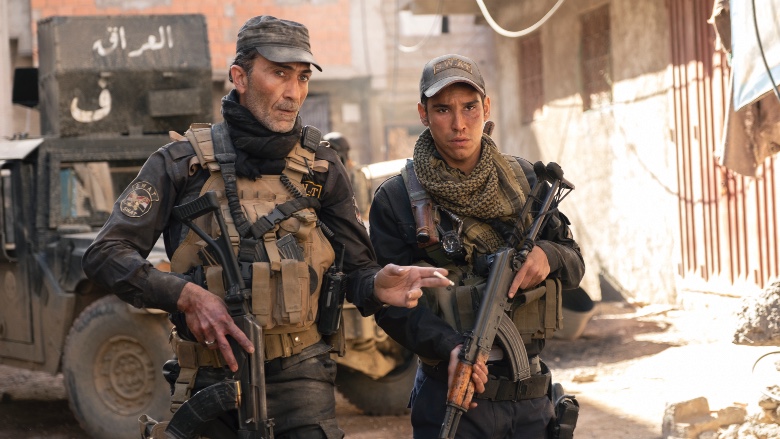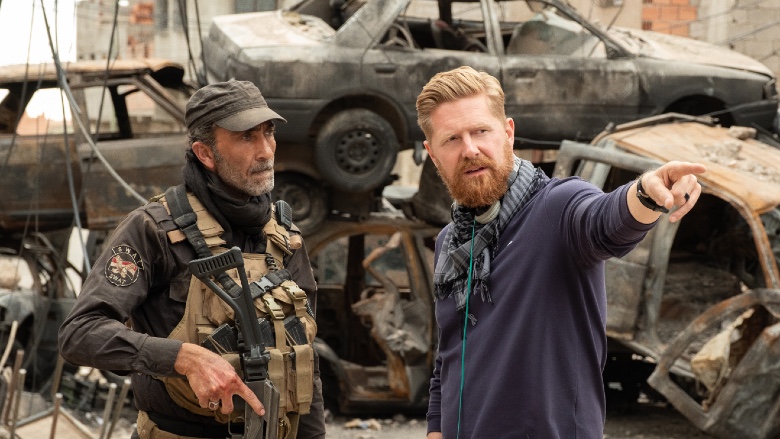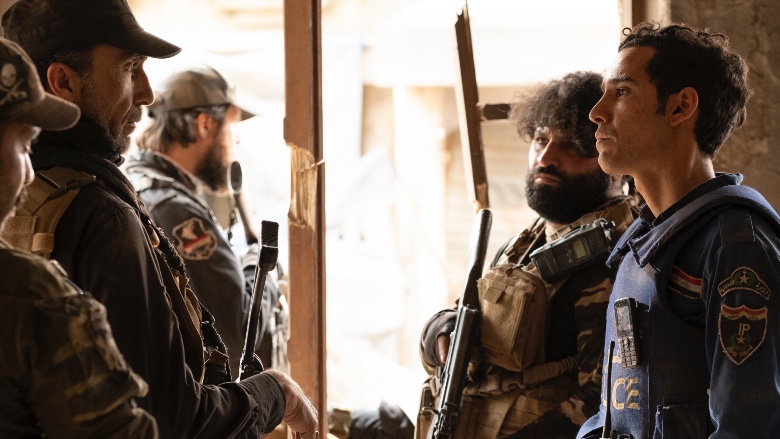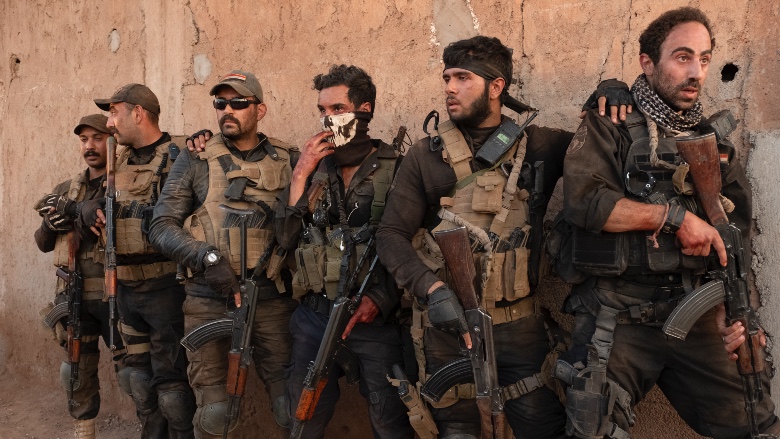
A SWAT team combs war-torn city streets looking for ISIS fighters in Mosul, streaming on Netflix starting November 26. Based on a true story, and starring an all-Arab cast led by Suhail Dabbach and Adam Bessa, the film unfolds over a single day of relentless firefights and sniper attacks. It’s the directing debut for screenwriter Matthew Michael Carnahan (World War Z), and Anthony and Joe Russo (The Avengers) are among the producers of a story adapted from a New Yorker article by Luke Mogelson.
“That New Yorker piece was a sort of Studs Terkel-look at a day in the life of these essentially illegal, off-the-books fighters who literally ran towards the sound of gunfire,” Carnahan said via a Zoom call. “There was a storyline about one of the younger members of the team that grabbed my imagination, and that’s where the movie came from.”
The United States has been at war with Iraq since Carnahan, now in his late forties, was in high school. He wanted to show what it was like for the people who live in a place like Mosul, a multicultural city with a 4000-year heritage that is under constant assault.
“It’s shameful to admit, but there’s a lot about this SWAT team and that part of Iraq that I was ignorant of,” he said. “Luke’s article grabbed me within the first couple of sentences. These people, these men and women, just want the same things we all want. What I wanted to do here is tell that story to the world. Show a completely different aspect of this war.”

Carnahan agreed that undertaking a film with a foreign cast, in a foreign language, was a challenge. On top of that, he had to cope with several large-scale action scenes that required extensive planning and effects, a three-week “boot camp” training program, and a script that kept evolving as he learned more about his cast. As a result, Mosul has an immediacy and accuracy missing from previous Hollywood depictions of the area.
The main cast members were taught military maneuvers by the Tiger Swan team, made up of former Delta Force, Green Beret, and French Foreign Legion agents.
“I didn’t want these guys to look like stereotypical Western special forces commandos,” Carnahan said. “I wanted them to exhibit skills that they would have learned through bloodshed. If you go into a room a certain way, three guys die. So change the way you go into the room.”
Military training took place in a partially abandoned hotel outside Marrakesh. The three weeks there gave the director the opportunity to revise his script based on the personalities who emerged during the intense, eight-hour sessions.
“Qutaiba Abdelhaq, who plays the medic, is one who pops to mind,” Carnahan said. “What he loved about his character was how he was a like a mother hen to the others, how he wouldn’t let the mission take their souls, make sure that they still had a degree of humanity at the end of the day. I had a hint of that in the first few drafts of the script, but he wasn’t a full-fledged character until Qutaiba developed him.”

Bessa plays the pivotal role of Kawa, a new recruit whose loyalties are questioned by the other SWAT members. Late in the film, Carnahan gave him an extraordinary close-up that lasts almost a minute. In it, you can see the actor trying to decide how to respond to the drama unfolding around him.
“I told him that’s the moment he’s debating, ‘Am I going to live and die with these men, or walk out on them?'” Carnahan recalled. “I just let him play that out, all the frustrations and questions he’s had through the movie. Also you have Mauro Fiore shooting it, so I could have watched it another ten minutes.”
The biggest surprise in the cast may be Dabbach, who was recommended to Carnahan by AGBO producer Michael Larocca. A well-known actor in Iraq until he was forced into exile, Dabbach was the opposite of how Carnahan originally envisioned Jasem, the burly, violent leader of the SWAT team.
“He was so soft-spoken during his read,” Carnahan said. “He wasn’t even doing the lines. He was talking about why he had to leave Iraq. Yet I couldn’t take my eyes off him. In that moment, I thought, I have to rethink this character.”
Carnahan embraced the advice he received from friends and mentors like the Russos. Take a moment early in the movie when Kawa first meets Jasem. Carnahan shot a version of the scene but wasn’t happy with it.
“I was lucky enough to have Anthony in Marrakesh on the set,” he remembered. “He said, ‘Give this guy an entrance. Let him walk right into camera, let the audience realize, oh my god, that’s somebody I need to keep an eye on.’ The Russos told me a story about Welcome to Collinwood, where Joe stumbled onto the same thing: ‘Hey, we’ve got George Clooney, we’ve got to give him a goddam entrance.'”
More practical help came in the form of a third cameraperson the producers added for some action sequences two weeks into the shoot. One scene involving 150 civilians fleeing from snipers took four days to rehearse and shoot.

“We would spend weekends with the Tiger Swan guys making shot lists, figuring out where our people would be,” Carnahan said. “And then all the credit should go to Mauro and Lucas Bielan, our A camera operator. Mauro will have his idea for what the shot should be, Lucas will get that, and our B and C operators, Cosmo Campbell and Lilia Sellami, would float. We just shot the hell out of it, Bruce Franklin the first AD giving himself an ulcer screaming through a bullhorn at the end of the street.”
Carnahan based his approach to the action on a friend who had served in the Israel Defense Forces and had survived a number of firefights.
“He said that in the middle of it, all you are trying to do is get more bullets moving toward them than they have at you,” the director said. “You forget your own safety, and that’s where the horror comes in. You forget that everybody down range isn’t an enemy.
“I tried to get that across, that as exciting as it may be to watch, there are horrible, life-changing, life-ending repercussions any time rifles fire like that.”
Mosul was originally intended for a theatrical release, but Netflix stepped in after the film screened at Toronto. Now instead of playing in 800 theaters, the movie is opening in 190 countries at once.
“Be careful what you wish for,” Carnahan said ruefully. He added a piece of advice he received from Peter Berg on the set of Deepwater Horizon: “Do not be a director, it’s a miserable experience. Be a writer. You stay at home, you raise your kids. But as you can see, I didn’t listen to him.”
All photos by Jose Caro.





